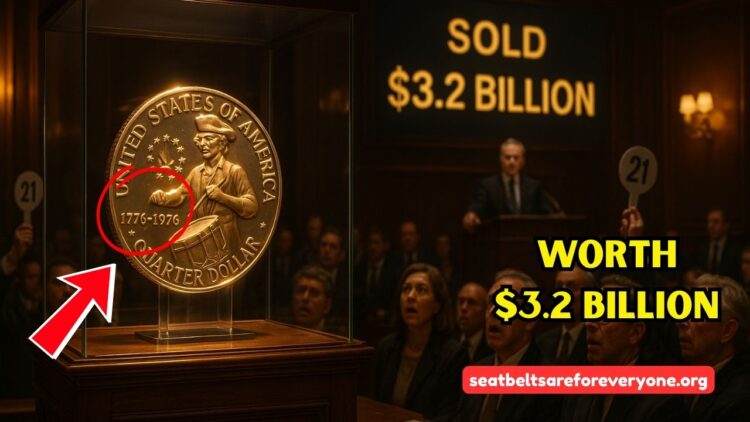Most of us don’t think twice about the coins in our pocket. A quarter usually buys a gumball or helps pay for parking. But in 2025, one rare U.S. Bicentennial Quarter stunned the world by selling for an unbelievable $3.2 billion. This story isn’t just about money—it’s about history, a mistake at the mint, and incredible luck. Let’s explore how a coin worth only 25 cents became one of the most valuable collectibles in history.
Why Bicentennial Quarter Sells For $3.2 Billion
A Bicentennial Quarter once shocked collectors when it reportedly sold for $3.2 billion at auction due to its extreme rarity and unique minting error. While most Bicentennial Quarters are common, special versions with rare features can attract astronomical bids from passionate coin collectors.
The Bicentennial Quarter’s Special Design
In 1976, America celebrated its 200th birthday. To honor this, the U.S. Mint released a special edition quarter. Instead of the usual eagle on the back, the coin featured a colonial drummer, symbolizing the spirit of the Revolutionary War. On the front, George Washington remained, but the date was shown as 1776–1976, marking the bicentennial celebration.
While millions of these coins were made, only a tiny handful had a rare error that changed everything.
Why Did This Quarter Become Worth Billions?
The coin’s sky-high value comes from a double-die error. This happens when the design is pressed onto the coin twice, slightly off-center, creating a blurred or doubled look on the text or images.
Only a few of these mistake coins exist. Their connection to America’s bicentennial and their scarcity made them highly desirable among collectors. In 2025, one coin in perfect condition (graded MS-68 or better) was sold at auction for $3.2 billion, setting a world record.
Quick Comparison
| Feature | Regular Bicentennial Quarter | Rare Double-Die Error Coin |
|---|---|---|
| Reverse Design | Colonial drummer | Colonial drummer (doubled) |
| Mint Mark | P, D, or none | Usually none (Philadelphia) |
| Value | 25 cents | Up to $3.2 billion |
How to Check If You Have One
Imagine finding such a coin in your piggy bank or change jar. Here’s what to look for:
- The “1776–1976” date on the front.
- The colonial drummer design on the back.
- Use a magnifying glass to spot doubled letters or images.
- Some rare versions were made with 40% silver, which adds even more value.
If you think you’ve found one, the smartest step is to get it verified by a professional coin grading service.
Other Quarters That Could Be Valuable
The Bicentennial Quarter isn’t the only surprising treasure in U.S. change. Here are some others worth checking:
- 2004 Wisconsin quarter (extra leaf error): $50–$100
- 1999 Delaware quarter (spitting horse error): $100+
- Silver proof State Quarters (90% silver): $30+ in mint condition
Hidden Wealth in Everyday Coins
The story of the $3.2 billion Bicentennial Quarter shows that even the smallest, ordinary-looking things can turn into life-changing treasures. Coins we overlook every day might carry history, mistakes, and value far beyond what we expect.
So next time you get a quarter back as change, take a closer look—you might just be holding a billion-dollar piece of history in your hand.
FAQs
Its value comes from a rare double-die error combined with historical significance and extremely limited supply.
Yes, but it’s very rare. Most are in private collections, though a few could still be in circulation.
Look for doubling in letters or images, check if it’s 40% silver, and have it graded by professionals.

